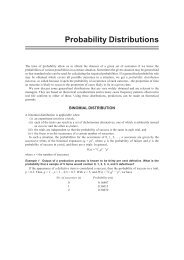International-Business-Dr-R-Chandran-E-book
International-Business-Dr-R-Chandran-E-book
International-Business-Dr-R-Chandran-E-book
Create successful ePaper yourself
Turn your PDF publications into a flip-book with our unique Google optimized e-Paper software.
130<br />
<strong>International</strong> <strong>Business</strong>- <strong>Dr</strong>. R. <strong>Chandran</strong><br />
disincentive to expropriation is concerned over the loss of future<br />
investments. Multiple joint ventures in different countries reduce the risk of<br />
expropriation, even if there is no local participation. If the government of<br />
one country does expropriate the business if faces the risk of being isolated<br />
simultaneously by numerous foreign powers.<br />
PROBLEMS FROM THE GORWTH OF MNCs<br />
Much of the concern about MNCs stems from their size, which can be<br />
formidable. MNCs may impose on their host governments to the advantage<br />
of their own shareholders and the disadvantage of citizens and shareholders<br />
in the country of operation. Even in India, MNCs have neglected the<br />
interests of the minority shareholders in the past.<br />
It can be difficult to manage economies in which MNCs have<br />
extensive investments. Since MNCs often have ready access to external<br />
sources of finances, they can blunt local monetary policy. When the host<br />
government wishes to constrain any economic activity, MNCs may<br />
nevertheless expand through foreign borrowing. Similarly, efforts at<br />
economic expansion elsewhere. Although it is true that any firm can<br />
frustrate plans for economic expansion due to integrated financial markets,<br />
MNCs are likely to take advantage of any opportunity to gain profits. As we<br />
have seen, MNCs can also shift profits to reduce their total tax burden by<br />
showing larger profits in countries with lower tax rates.<br />
Concern has been expressed, especially within the US, that their<br />
MNCs can defy the foreign policy objectives of the government through<br />
their foreign branches and subsidiaries. MNCs might break a blockade and<br />
avoid sanctions by operating through overseas subsidiaries. This has led to<br />
greater concern in some host countries, as they feel that companies operating<br />
within their boundaries may follow orders of the US or any other foreign<br />
government, and even within international trade unions. For example, in<br />
1981 Chrysler Corporation was given loan guarantee to continue its<br />
operation. The US government insisted on wage and salary roll backs as a<br />
Only for Private Circulation





